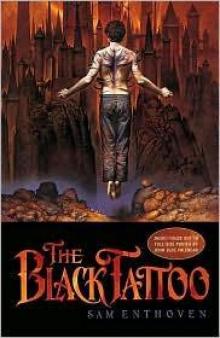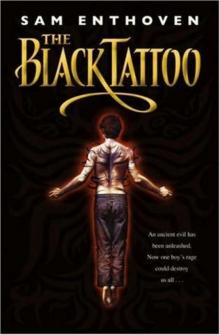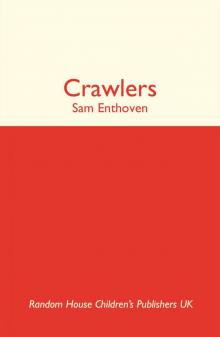- Home
- Sam Enthoven
Crawlers
Crawlers Read online
Contents
Cover
About the Book
Title Page
Dedication
London
London Wall, EC2
Goswell Road, EC1
The Barbican Centre
Great Ormond Street Hospital for Children
The Swatham Academy for Girls
Acknowledgements
Also by Sam Enthoven
Copyright
About the Book
Four boys and four girls are on a trip to the theatre. Little do they know that they will never see the play. They're about to be plunged into a nightmare.
Beneath the theatre lies a secret.
And now she has been released . . .
To Jack Finney, John Carpenter, H. R. Giger
and Valve Software, with thanks for
some of my very favourite nightmares
‘And soul by soul and silently her shining bounds increase . . .’
Cecil Spring-Rice
from I Vow to Thee, My Country
LONDON
The financial district, aka the City. Deep underground.
6:16 PM.
IN THE DARK pit that had been my prison for almost three hundred and fifty years, Steadman’s latest victim was regaining consciousness.
‘Mr Miller?’ said Steadman’s voice from the pit’s wall-mounted speakers. ‘Mr Miller? Can you hear me?’
There was a groan. ‘Wh . . . what?’ The voice was that of a young man, not much more than a teenager. ‘Where am I? What . . . what happened?’
‘I imagine,’ said Steadman, ‘that the last thing you remember is lunch at my club. You spent most of the meal boasting about some trivial few million you made on the money markets this morning. For my part, I allowed you to imagine that the Corporation might be interested in you for a purpose other than your present one – and drugged your wine.’ He sighed. ‘Shocking way to treat a fine Margaux, I know. But then, so was wasting it on you.’
‘Mr Steadman,’ said his victim, trying for reason, ‘Lionel, I don’t—’
‘Kindly shut up and let me tell you what you’re doing there.’
Miller fell silent.
‘I . . . hate you,’ Steadman began. ‘I’ve never had the chance to say this to one of you before, but I’ve hated people like you my whole life. Ever since school, where my existence was made a misery by a smug, self-satisfied waster just like you, I have quietly dedicated my life to finding ways to revenge myself on your kind.
‘Something unpleasant is about to happen to you. But you can comfort yourself with two things. First, it will be over far more quickly than you deserve, and second, you’re in a very privileged position. You, Mr Miller, are about to serve the Queen.’
I took my cue.
‘Gah!’ cried Miller into the darkness when I first touched him. ‘What’s that?’
‘What’s what?’ Steadman asked, amused.
‘There’s something . . . crawling. Like a spider. It’s . . . going up my legs. Now it’s on my back! I can’t . . . Oh! Oh, God! GET IT OFF ME!’
Mr Miller shrieked – a short, high note, his voice driven to that pitch by absolute terror.
The shriek stopped.
Then I spoke through his mouth.
‘I . . . like this one, Steadman.’ The words were husky and thick at first as I worked the unfamiliar vocal cords. ‘He’s young. Healthy. Much better than the sickly things you usually bring me.’
‘A treat for you, my Queen,’ said Steadman. ‘And he’s just the first of many. As of now, you no longer have to make do with those dregs I can steal from the streets without anyone noticing. As of this moment, you can take anyone you want.’ He paused, then said: ‘You are free.’
Free. More than three centuries had passed while I had been held captive in this pit. In the early days Steadman’s predecessors had kept me here with spiked chains and armed guards. Behind those guards had stood more guards, their weapons trained on the first in case I did what I do.
Now, in Mr Steadman’s time, I heard an echoing hiss and a whine of machinery. As the lid of my pit drew back I allowed myself a moment of triumph. From that first, blazing night when they caught me I had known this day would come. The reason was simple: they had not killed me. Even in 1666 the Corporation of London had recognized my . . . gifts.
‘You accept my offer then, Steadman?’ I asked him, through the young man’s mouth.
‘Not . . . quite.’ Even through the speakers on the pit walls I could hear the smile in Steadman’s voice.
‘To the left of your pit,’ he said, ‘there is a door. Through it you could go anywhere you want, but the door is shut and the only one who can open it is me. To the right of your pit is a second door: that door is open. It leads to the building above us, a building known as the Barbican. There I’ve set up . . . a little bet.’
I waited. I had waited a long time. I was patient.
‘You’ve never seen the Barbican, of course,’ said Steadman. ‘The Corporation completed it in nineteen sixty-nine – rather after your time. Then, it was the largest performing arts centre in Europe. Now . . .’ He paused. ‘Well, you’ll find out.
‘I’m giving you a chance to prove yourself, my Queen,’ he went on. ‘If you show me that you can do what you claim, I’ll accept your offer. The first door will open. We’ll go through. Together, you and I will take charge of this world and run it the way it should be run.’
‘And if I . . . displease you?’
‘This room, along with the whole of the Barbican, is rigged with explosives. At midnight precisely they will detonate. The entire building will be destroyed, erasing all evidence of tonight’s events – including, if I have not opened the first door, you. Do we understand each other?’
‘Yes.’ I understood him better than he knew.
‘Then go, my Queen,’ said Steadman. ‘You have less than six hours. If you’re as powerful as you say, you’ll know what to do. And I can hardly wait,’ he added, ‘to see you do it.’
Already my hands were moving. All of them. The pit resounded with soft, crawling sounds.
My wait was over. Now, at last, I could begin.
LONDON WALL, EC2.
The minibus of the Walsingham School for Boys, approaching the Barbican from the south.
7:18 PM.
BEN FREEMAN LOOKED out at the passing streets and thought how much he hated his school.
The Walsingham School for Boys was a smart, fee-paying boarding school in Sussex. Ben hated that his days and even his nights there were strictly scripted and timetabled; he hated the school’s relentless focus on ‘excellence’ which, at Walsingham, meant sport, exams or both – and nothing else. But there was a third reason.
Ben was the youngest in his family: he had two older sisters. He’d grown up in a female-dominated household, so Ben supposed that his parents had sent him to Walsingham in the hope he would make friends with other boys. It was a good theory. Ben’s two abiding loves in life – games and horror films – were things his sisters, his mum and lately even his dad all seemed to find somehow regrettable. So when Ben had first arrived at Walsingham the previous term, he had hoped to meet people who shared his tastes – some like-minded guys he could get on with.
Instead, Ben had met the people in the minibus.
‘Here’s an interesting fact for you, boys . . .’ said Mr Clissold.
Each student at Walsingham was put into a small tutor group, looked after by one of the teachers. The idea was to provide a less formal support network outside main school hours, someone the students could go to if they had stuff to discuss. Tutors also organized outings for their groups, like tonight’s to the theatre. Mr Clissold, Ben’s tutor, had bad breath. Also his definition of ‘interesting’ wasn’t the
same as Ben’s – or, Ben reckoned, most people’s.
‘You know that London’s divided into boroughs?’ said Mr Clissold. ‘Well, technically the City isn’t actually one of them.’
He paused. Ben and the three other boys in the tutor group did not reply.
‘It’s because of the way the City is run,’ Mr Clissold explained, undeterred. ‘It’s very unusual. Unlike the rest of the country, instead of a local council the City is governed by a special self-appointed body of officials: the Corporation of London.’
‘It’s been that way for centuries,’ said Josh Compton-Smith. ‘Isn’t that right?’
‘That’s right, Josh,’ said Mr Clissold, surprised. ‘Since eleven forty-one, in fact, when—’
‘The Corporation’s not terribly famous, it’s true,’ said Josh, ‘but it’s extremely influential. They own some of the most valuable land and property in the world, including five of London’s bridges and most of the City itself. They’ve got their own special police force – the City of London Police. They’ve even got a private power station, so the City keeps on running no matter what.’
‘That’s . . .’ said Mr Clissold, taking his eyes off the road for a second. ‘Actually, Josh, it seems you know more about this subject than I do.’
Josh Compton-Smith gave his most dazzling grin, shrugged and said: ‘Of course. My dad works for them.’
Ben rolled his eyes and went back to looking out of the window.
Josh was old for their school year, almost fourteen. He had floppy blond hair, and perfect teeth, and clear skin tanned by expensive holidays. Josh owned the latest gadgets. He was captain of the football team. His exam results were excellent. He even managed to make the school uniform, with its nasty maroon blazer, somehow look good on him. Everyone at Walsingham liked Josh. Everyone, in turn, wanted Josh to like them.
Ben, four months off fourteen himself, was dark-haired, pale and freckled. On Ben’s narrow shoulders the maroon jacket looked ridiculous. And Ben thought Josh was an arrogant prick.
BRAAAAAAAAP. The warm air in the minibus was tainted by a pungent waft of semi-digested sausages.
‘Hugo,’ said Josh mildly.
‘Sorry, mate,’ said Hugo Walsh, grinning.
Massive, square-headed, broad-shouldered, with bristly red hair, Hugo gave off a constant whiff of body odours of various kinds. He was destined to be an officer in the army, just like his father had been. He was Josh’s right-hand man and he loved it, hanging on Josh’s words, laughing at his jokes. Hugo himself only had one joke: he didn’t tell it with his mouth but he told it again and again, and every time he did, everyone except Ben acted like it was the funniest thing they’d ever heard.
‘Mr Walsh,’ said Mr Clissold, ‘I do believe you produce more greenhouse gases than this minibus.’
‘That certainly was a particularly noxious emission, mate,’ said Josh with approval – making Hugo’s grin widen.
‘He’s a one-man ecological catastrophe!’ said Robert Cubbage.
Josh looked at Robert and raised an eyebrow. Hugo’s grin froze. The minibus fell silent.
Here we go again, thought Ben.
Robert was still smiling, but in his round, pudgy face his large cow-like eyes were darting about nervously. Robert was young for their year, not much more than thirteen. He was overweight and a bit sweaty. Robert wanted to be accepted. He would do anything to join Hugo and Josh, be part of their team, bask in their glow.
‘I do so love your accent, Robert,’ Josh purred after a moment, once he’d selected which form Robert’s humiliation would take this time. ‘Let’s hear it again: say “photograph”.’
Ben watched as Robert started to squirm.
Accents mattered at Walsingham: there was only one acceptable way to speak and any deviation set you apart from the crowd, left you vulnerable. Robert worked harder than most to hide his home accent. It was part of his effort to be accepted. But Josh knew the truth and would never allow Robert or anyone else to forget it.
Robert’s smile faltered. ‘Photograph,’ he said gamely, keeping the ‘o’s and ‘a’ long.
‘Not like that,’ said Josh. ‘Say it how you normally say it.’
Robert looked at his feet.
Why does Robert put up with this? Ben wondered, watching him. Why did anybody?
‘Photograph,’ murmured Robert, in his own voice.
‘Footergruff,’ echoed Josh, delighted. ‘Have I got that right, Robert? Footergruff. You try it, Hugo.’
‘Footergruff,’ said Hugo, grinning again.
‘Footergruff!’ said Josh – then sneered. ‘It sounds like one of Hugo’s farts.’
Ben cleared his throat and said: ‘Leave him alone, Josh.’
Josh flinched. ‘What did you say?’
‘I said,’ said Ben, ‘leave him alone.’
‘Now, boys,’ said Mr Clissold nervously from the driving seat. ‘There’s no need for unpleasantness.’
‘None intended, sir,’ said Josh, sounding shocked for the teacher’s benefit, but staring hard at Ben. ‘We were only having a bit of fun. Weren’t we, Robert?’
‘That’s right,’ said Robert.
‘Ben here just got the wrong end of the stick,’ said Josh, with a smile that showed his teeth. ‘Didn’t you, mate?’
Ben gave Josh an answering smile that was every bit as sincere as Josh had been in calling him ‘mate’. But said nothing.
GOSWELL ROAD, EC1.
A London bus, route number 153, approaching the Barbican from the north.
7:21 PM.
AN EXPLOSION OF sound resolved into beats. There was a bar of keyboard intro, made thin and tinny by a mobile phone’s built-in speaker. Then Samantha Jackson and Lauren Wallace started to sing.
‘OOOOOOOH baby babe . . .’ they crooned, grinning at each other as everyone on the bus turned to stare at them.
Ms Gresham, their teacher, gave them a weary look. ‘Stop that, you two.’
‘OOOOOOOH baby babe,’ Samantha and Lauren sang, louder, ‘I’m a slave to your love!’
Jasmine Ashworth rested her head against the cool glass of the bus window and sighed.
The Swatham Academy for Girls was a comprehensive in East London. Jasmine, Samantha and Lauren had been students there since they were eleven. Having no minibus was among the least of Swatham’s problems: government inspectors had recently put the Academy on what they called ‘special measures’. Officially described as ‘inadequate’ in the inspectors’ report, the school had been given one year to show drastic improvement or it would be closed.
‘Samantha and Lauren, turn that music off right now,’ said Ms Gresham.
Ms Gresham was a supply teacher, recently drafted in to Swatham as part of the improvement drive. Jasmine liked her. She was young for a teacher, and with her chic, boyish bob and her smart grey trouser suits she looked good too. Also, unlike some teachers Jasmine could name, Ms Gresham was passionate about her subject – English literature – hence tonight’s outing to the theatre. Ms Gresham had a black belt in aikido. She had crossed America on a Harley-Davidson. She had done things with her life. None of that made the slightest difference to Samantha and Lauren.
‘Why?’ Samantha asked as the tinny beats continued.
‘Yeah, miss, what we got to turn it off for?’ said Lauren.
‘Two reasons,’ said Ms Gresham. ‘First, you’re disturbing the other passengers on this bus. And second, because if you don’t, then on Monday you’ll both get two hours’ detention.’
Jasmine lifted her head from the glass and watched what happened next in the reflection against the darkness outside.
Lauren was pouting – which in Jasmine’s opinion was never a good look for her: with Lauren’s chubby cheeks, big forehead and squashed nose it tended to make her look even more like a sulky pug dog than she did already. But Lauren wasn’t the reason Jasmine didn’t want to turn round yet.
Samantha was looking Ms Gresham dead in the eye.
In the three years since they’d all started at Swatham, Samantha had made herself quite a reputation. She had been suspended for fighting no less than three times – once, most memorably, for grabbing another girl by the hair and slamming her face into the edge of a hand basin in the toilets, breaking the girl’s nose. To avoid outright expulsion for this incident Samantha had claimed she’d acted in self-defence. Her victim – understandably wary of making Samantha angry again – had backed up her story. Jasmine, and almost everyone else at Swatham, had used the same caution around Samantha ever since.
‘I’m not kidding, Samantha,’ said Ms Gresham, looking straight back. ‘Turn that music off or you’ll be sorry.’
Like Jasmine, Samantha was nearly fourteen. Her hard blue eyes and prominent cheekbones gave her a face a narrow, pinched look. Slowly she touched a finger to a loose strand of her bottle-blonde hair, tucking it behind her ear. Then, once she’d made it clear she wasn’t being rushed, she dropped her eyes to her phone. The music cut out.
‘Miss,’ she said, rolling her eyes, ‘it’s boring on this bus, innit.’
‘Yeah, miss,’ chorused Lauren. ‘We’ve been on here for ages!’
‘It’s not far now,’ said Ms Gresham (though Jasmine thought she sounded every bit as impatient to get there as Samantha and Lauren). ‘The curtain goes up at seven forty-five. We should arrive just in time to get to our seats. But right now, we’ll just have to pass the time with a little conversation. What shall we talk about?’
No answer.
‘How about what you’re all going to do when you’re older?’ said Ms Gresham brightly but with obvious desperation. ‘Well? Who wants to start?’
Now Jasmine had another reason to keep looking out of the window. She knew exactly what she wanted to do when she was older. But she wasn’t about to mention it now.
Jasmine was an only child. Her mother worked shifts at their local supermarket; her father, a musician, had left before Jasmine was born. Jasmine’s mum wanted Jasmine to leave school at sixteen, get herself a paying job to help support them both – ‘start pulling her weight’, as she put it. Obtaining her permission to come to the play tonight had been bad enough; when Jasmine had told her mum about her real ambitions, there had been a row. Her mother had called Jasmine ‘a dreaming good-for-nothing like your dad’. But Jasmine knew she wasn’t a dreamer. She had plans.

 The Black Tattoo
The Black Tattoo Black Tattoo, The
Black Tattoo, The Crawlers
Crawlers TIM, Defender of the Earth
TIM, Defender of the Earth